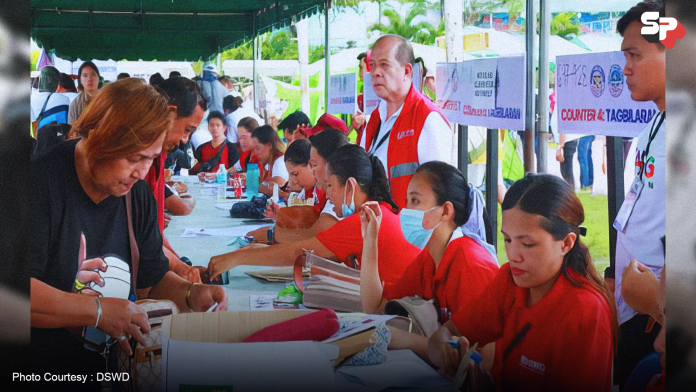MANILA – A total of 246, 786 individuals have been provided with short-term employment and income during the first semester of 2024 through the cash-for-work and training (CFW/T) initiatives of various programs and services of the Department of Social Welfare and Development (DSWD), an official said on Friday.
“The DSWD, through the CFW initiatives of the agency’s different programs and services, provides immediate employment opportunities for vulnerable and poor individuals. This initiative is designed to support families and persons affected by economic challenges and disasters among others, while promoting community development through productive work,” DSWD Assistant Secretary Irene Dumlao said in a news release.
The DSWD spokesperson said the nearly 250, 000 beneficiaries of the DSWD’s CFWs can be viewed as the agency’s contribution to the decrease in the number of unemployed and underemployed last August.
The Philippine Statistics Authority (PSA) reported on October 7 that the unemployment rate fell to 4 percent in August from 4.7 percent in July and was also lower than the 4.4 percent clip registered in August last year.
This meant that 2.07 million Filipino workers were unemployed, down from 2.38 million in July.
The PSA said underemployment rate also fell to 11.2 percent in August from 12.1 percent in July and 11.7 percent in August last year. This meant that 5.48 million were considered underemployed in August, down from 5.78 million in July and 5.63 million in August last year.
The CFW is a short-term intervention to provide temporary employment to individuals by participating in or undertaking productive work in their communities. In exchange for the work rendered, recipients are provided with cash to meet their basic necessities.
Dumlao said the CFW is being undertaken in the agency’s programs such as the Tara Basa! Tutoring Program, the KapitBisig Laban sa Kahirapan-Comprehensive and Integrated Delivery of Social Services (KALAHI-CIDSS), Project LAWA (Local Adaptation to Water Access) and BINHI (Breaking Insufficiency through Nutritious Harvest for the Impoverished), and Early Recovery Services.
CFW for college tutors, youth dev’t workers, parents
For this year’s implementation of the Tara, Basa! Tutoring Program, a total of 10, 733 college students and 61, 878 parents have received cash assistance from the agency through the CFW modality of the program, according to the DSWD.
Under the tutoring program, college students were deployed as tutors who conduct reading sessions to struggling or non-reader elementary students, and as youth development workers (YDWs) who were trained to facilitate the Nanay-Tatay teacher sessions.
In exchange for rendering 20 tutoring and learning sessions, these tutors and YDWs received cash-for-work (CFW) based on the prevailing regional daily minimum wage rate in their areas.
Parents and guardians of struggling and non-reader elementary students also received CFW for attending the 20 Nanay-Tatay teacher sessions.
CFW for students, vulnerable sectors
The KALAHI-CIDSS CFW modality is seen as an opportunity to help the vulnerable sectors improve their quality of life, an avenue to engage in community services, rehabilitate damaged infrastructure, and implement community projects relative to disaster preparedness, rehabilitation, and risk reduction.
The beneficiaries of the KALAHI-CIDSS CFW are students and newly graduates, persons with disabilities, and disaster-affected individuals, among others.
“From September 2023 to October 2024, the DSWD has offered cash support to 26, 332 college students and graduates in exchange for community work and other services they rendered,” Dumlao said.
The KALAHI-CIDSS’ CFW aims to kick-start the career paths of college graduates, who are still looking for employment, and students as they gain practical work experience.
Under the program, student-beneficiaries work for 90 days to facilitate their transition into the workforce.
Dumlao said 39, 194 persons with disabilities also benefited from the CFW program of the KALAHI-CIDSS.
“The CFW Program for persons with disabilities is a cash support in exchange for the agreed community works/services/tasks rendered for a minimum of six days to a maximum of 10 days,” she said.
She said 6, 790 members of the Socorro Bayanihan Services Inc. also received cash aid in exchange for engaging in services such as de-clogging of canals, participation in clean-up drives, tree planting activities, and road clearing in their community.
From November 2023 to August this year, the DSWD provided temporary employment to 21, 117 individuals who were affected by Typhoon Egay that hit the country in July 2023.
CFW for disaster mitigation, early recovery
Dumlao said 41,633 individuals benefited from the CFW under the Project LAWA (Local Adaptation to Water Access) and BINHI (Breaking Insufficiency through Nutritious Harvest for the Impoverished) which focuses on mitigating the impact of food insecurity and water scarcity caused by El Niño while preparing for the potential effects of the rainy season.
Under the Project LAWA and BINHI, partner-beneficiaries are provided with additional income support by participating in building water access infrastructures and implementing sustainable farming practices.
In addition to the continuous provision of social protection programs and social safety nets for disaster-affected families, the DSWD has been implementing Early Recovery Services.
For the first semester of 2024, more than 39, 000 disaster-affected families have benefited from the CFW under the agency’s Early Recovery Services.
“These beneficiaries were engaged in the establishment of camp management facilities – water, sanitation and hygiene (WASH), child-friendly spaces (CFS), women-friendly spaces (WFS), and temporary learning spaces (TLS) in camps/evacuation centers or transitional shelters,” Dumlao pointed out.
She said the CFW is the agency’s way to address the lack of an income source of the vulnerable sectors to enable them to meet their daily basic needs. (PNA)

